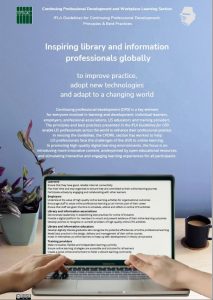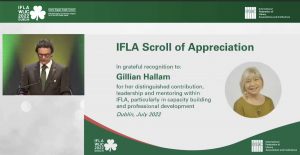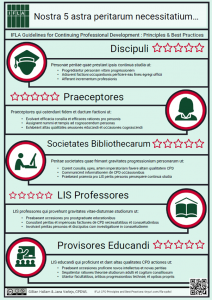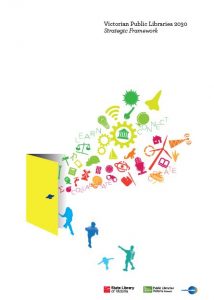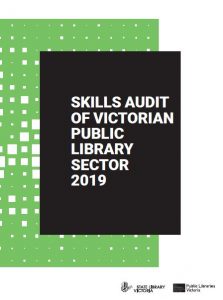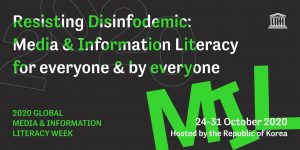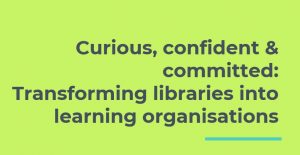
On 13 October 2021, CPDWL and NPSIG hosted the webinar entitled ‘Curious, confident & committed: Transforming libraries into learning organisations’. Our invited speaker was Clare Thorpe, Director, Library Services at Southern Cross University in Australia.

Clare is an award-winning library leader and practitioner-researcher who has worked in Australian academic and state libraries since 2001 and she is currently a Director on the Board of the Australian Library and Information Association (ALIA). She is passionate about engaging library and information workers in professional development (PD) and has a track record of fostering a culture of learning in the teams that she leads.
This blog post provides a brief review of the webinar which we hope will inspire you to listen to the recording – see the links to our resources at the end of the post.
The focus of Clare’s presentation was on the strategies library leaders and managers can use to foster a culture of learning in their organisation, drawing on her own experience working in multi-campus university libraries in Australia. The key message was that if library staff and their teams were encouraged to engage in learning as part of their everyday work, so much more will follow. These ideas were discussed in Clare’s recently published journal article “Transforming a university library into a learning organisation” [1].
The webinar opened with a brief introduction to the concept of the learning organisation, so that Clare could then discuss how she put these theories into practice. We can thank Peter Senge for the ideas that he explored in the book The fifth discipline: The art and practice of the learning organization [2][3]. The ‘five disciplines’ refer to the five principles and practices that Senge had identified to help people to appreciate the value of individual leaning, to understand the ways other people think, to develop a shared vision for the future, to learn together to achieve their common goals, and to comprehend the interconnections between elements in the world that lead to productive outcomes for all involved.
Senge argued that the inevitability of change meant that people need to consistently challenge their traditional beliefs and practices. He believed that, in a learning organisation, staff across the organisation can work together to find novel ways to solve problems and to implement positive change. The workplace therefore becomes a playground for creative ideas and a safe place where people can take risks and test out new ideas. Everyone’s ideas are valued, regardless of the position they hold in the organisation. Karash [4] concluded that it is simply more fun to work in a learning organisation!
Clare opened her presentation with the challenge that work should become ‘learningful’ (Senge, p.4) [3]. It was critical that learning was viewed as a natural part of the working day, not as something staff were expected to do in their own time. Responsibility for this did not only lay with library managers, but also with the individual staff members themselves. She explained that there were three key building blocks for a learning organisation: a supportive learning environment, well defined learning practices and processes, and leadership that reinforces learning [5]. She outlined her own principles of workplace learning:
- Learning agency and autonomy: staff can construct their own learning path and focus on topics important to them
- Flexibility: staff can draw on different tools for different learning tools
- Social connectedness: staff can find ways to participate, value each others’ expertise and share learning with others
- Experimentation: staff can find space to foster creativity and exploration.
Clare stressed that workplace learning was definitely more than just ‘going to conferences’… it is all about consuming, creating and engaging. Importantly, today there are so many opportunities for people to discover new ideas: through reading journal articles, books, blogs, through listening to podcasts, and through watching webinars and videos. Equally well, there are so many ways to create and present their new ideas, for example through textual, audio and visual channels, and by connecting and interacting with other people to share these ideas and to develop up them further.
Learning is often viewed as an individual activity, but Clare pointed to Senge’s principle of ‘shared understanding’. She felt that it is critical for the individual staff member’s professional development activities to support their career growth, but they should also be relevant to and aligned with the library’s own future directions. There needs to be a common vision for the future and common goals to work towards, so that everyone, regardless of their role in the library, understands that their personal learning journey will contribute to the attainment of the common goal. Accordingly, professional development goes beyond being an individual activity to become a collaborative one. People should confidently share what they have learnt so that the colleagues in their work team, and across the whole library, can build new skills and capacity together.
Kolb’s experiential learning cycles [6] offer a really good model to help library staff to conceptualise the learning journey. This starts with a person attending a PD event or engaging in a learning activity, then they take time to review the experience and reflect on their learning, which encourages them to share with their colleagues and ultimately to apply the learning through active experimentation – which in turn opens up the next cycle of learning.
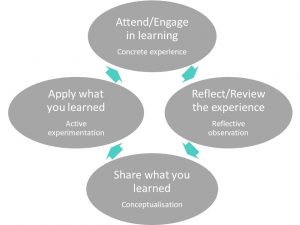
Thanks were extended to Michael Stephens from San José State University in California, USA, for a very simple strategy for reflecting-sharing-applying the learning, referred to as the 3-2-1 approach. Clare suggested that, after participating in a learning activity, you should identify three things you were introduced to that amazed you, two concepts that you will focus on, and one idea that you will apply immediately.
It was important for staff members to demonstrate curiosity by reflecting on their job and thinking about what they may need to learn now, to do their job better, as well as to look to the future to consider what they hope to learn so that they continue to grow and develop the new skillsets that will shape their career. They also need to recognise where help and support is needed to build greater confidence.
Over the past couple of years, the COVID-19 pandemic has drastically reduced the chance to attend face-to-face PD events, but it has not stopped people learning. Instead, it has opened up fresh opportunities to optimise the use of digital tools and channels such as blogs, podcasts, Twitter, videos, webinars, and the amazing array of resources published online. While digital workplace learning activities can be self-driven, they can also be undertaken by two or three colleagues together, there can be a team approach, or guidance and direction can come from the library leaders.
Commitment to learning can be demonstrated in a number of ways that benefit the individual, all colleagues in the library, the wider library and information community, and our profession as a whole. Reflective and critical practice can deepen the impact of learning activities, improve decision making and planning, and build confidence. Social learning builds a culture of learning by fostering an environment where colleagues share their experiences with each other, especially in a multi-campus institution. Contributing to personal learning networks and online social media communities results in a far stronger sense of community engagement, while engaging in evidence based practice adds to the body of professional knowledge and contributes to the advancement of the library and information profession.
In closing her presentation, Clare shared six recommendations to guide anyone interested in exploring the idea of the library becoming a learning organisation more deeply:
- View learning as a natural part of the working day
- Define the value of learning and articulate the responsibilities of the individual and the employer
- Encourage enquiry, curiosity and exploration, and create a safe space to take risks and make mistakes
- Encourage staff to share stories and to work together to build competence, confidence and career development
- Promote independent learning through online resources and social media channels
- Recognise and reward the effort staff put into their learning and the outcomes they achieve.
The webinar then continued with an active Q&A session which allowed Clare to provide more details about specific approaches and strategies she had mentioned. Plenty of people were really keen to transform their library into a learning organisation! To gain further insights, we encourage you to visit the CPDWL webinar page and access the full recording of the webinar, as well as Clare’s presentation slides. Her published article [1] is also a great read!
Resources
CPDWL Webinars webpage
Curious, confident & committed: Transforming libraries into learning organisations
References
[1] Thorpe, C. (2021). Transforming a university library into a learning organisation. Library Management, 42(6/7), 436-447. https://doi.org/10.1108/LM-01-2021-0003
Open access version.
[2] Senge, P. (1990). The fifth discipline: The art and practice of the learning organization.
New York: Doubleday.
[3] Senge, P. (2006). The fifth discipline: The art and practice of the learning organization. Rev.ed. Milsons Point, NSW: RandomHouse.
[4] Karash, R. (1995). Why a learning organization?
[5] Garvin, D.A., Edmonson, A. C., & Gino, F. (2008). Is yours a learning organization?
Harvard Business Review, 86(3), 109–116.
[6] McLeod, S. (2013). Kolb’s learning styles and experiential learning cycles. https://www.simplypsychology.org/learning-kolb.html
